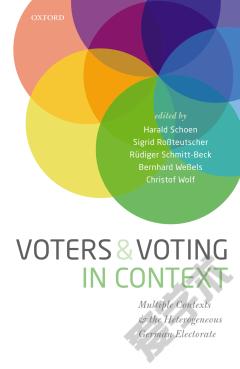Voters and Voting in Context —— Multiple Contexts and the Heterogeneous German Electorate
----- 选民和投票背景:多样化的背景和各种各样的德国选民
Voters and Voting in Context investigates the role of context in affecting political opinion formation and voting behaviour. Building on a model of contextual effects on individual-level voter behaviour, the chapters of this volume explore contextual effects in Germany in the early twenty-first century. The volume draws upon manifold combinations of individual and contextual information gathered in the German Longitudinal Election Study (GLES) framework and employ advanced methods. In substantive terms, it investigates the impact of campaign communication on political learning, effects of media coverage on the perceived importance of political problems, and the role of electoral competition on candidate strategies and perceptions. It also examines the role of social and economic contexts as well as parties' policy stances in affecting electoral turnout. The volume explores the impact of social cues on candidate voting, effects of electoral arenas on vote functions, the role of media coverage on ideological voting, and effects of campaign communication on the timing of electoral decision-making. Voters and Voting in Context demonstrates the key role of the processes of communication and politicization in bringing about contextual effects. Context thus plays a nuanced role in voting behaviour. The contingency of contextual effects suggests that they will become an important topic in research on political behaviour and democratic politics.
{{comment.content}}








 京公网安备 11010802027623号
京公网安备 11010802027623号